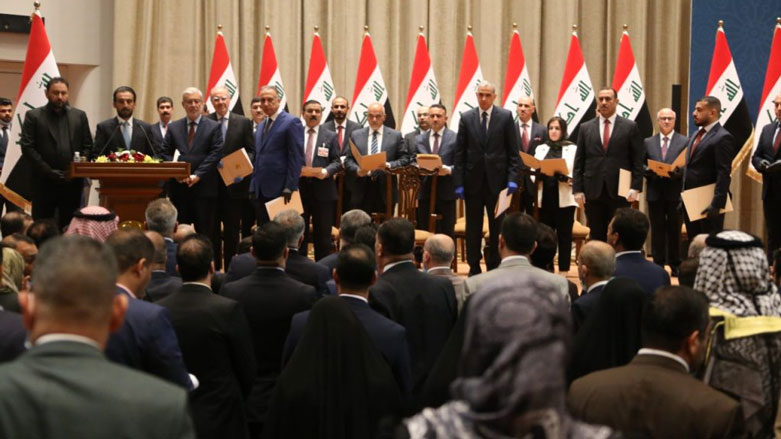Mustafa al-Kadhimi voted in as Iraq’s prime minister
In a late-night session that ran into the early hours of Thursday, the Iraqi parliament gave its vote of confidence to Mustafa al-Kadhimi, making him the nation's new prime minister, along with all but five ministerial nominees for his proposed cabinet, ending a protracted, five-month-long political deadlock to form a successor government after the previous premier stepped down amid a mass protest movement.

ERBIL (Kurdistan 24) – In a late-night session that ran into the early hours of Thursday, the Iraqi parliament gave its vote of confidence to Mustafa al-Kadhimi, making him the nation's new prime minister, along with all but five ministerial nominees for his proposed cabinet, ending a protracted, five-month-long political deadlock to form a successor government after the previous premier stepped down amid a mass protest movement.
The emergency session was slated to begin at 9 p.m. on Wednesday, but intensive, last-minute negotiations delayed it by over three hours, a common prelude to significant political deals in Iraq. The official gathering finally began shortly after midnight when Kadhimi first delivered a speech outlining his government program.
After this, lawmakers in session voted on Kadhimi and 15 out of 22 proposed ministerial candidate separately. Aside from the five posts still vacant because of failing to get the required votes, Khadimi's choices to lead both the oil and foreign ministries have not been submitted, presumably because parties could not reach an agreement in time.
“My cabinet has earned parliament’s support and we will work to earn the trust and support of the Iraqi people,” he said in a tweet following the vote. “I am grateful to those who worked with us to form the government. I urge all political actors to come together around a national program to serve Iraq's interests.”

Kadhimi takes on the role as interim prime minister amid a series of ongoing domestic, regional, and international crises that are plaguing the country. In his speech to lawmakers, he noted the “difficult times” Iraq is now facing.
He called on all sides to “unite” efforts to bring about “change.” Kadhimi also delivered a summary of his government program, saying that on top of his agenda is working to effectively limit the spread of the new coronavirus disease, protecting peaceful protesters while prosecuting groups responsible for their killing, tackling economic challenges, and combatting corruption, among others.
The new premier has detailed his cabinet’s agenda in a four-page document in eight points, with the purported aim of limiting the scope of his transitional government, among the top priorities of which is to facilitate early elections, a key demand of anti-government protests.
Demonstrations began in October and continue still, though with decreased intensity due to the coronavirus outbreak. The movement forced the resignation of now-former Prime Minister Adil Abdul Mahdi in late November.
Since they began to take to the streets across the country's southern and central provinces, members of the Iraqi security forces and Iranian-backed Shia militias have killed hundreds of protesters and wounded over tens of thousands of others.
As the vote for Kadhimi’s cabinet was taking place, a gathering to protest the process and reject the new premier was held in the capital. Kadhimi, who has served for years as the country’s intelligence chief, is the third man nominated to lead the nation after Adnan al-Zurfi and Mohammed Allawi failed to get the parliamentary support they needed.
The ongoing protest movement that continues to demand systematic change in the national political system, the coronavirus pandemic that is crippling governments worldwide, potential economic repercussions of falling oil prices, an uptick in attacks by remnants of the Islamic State, and Erbil-Baghdad disputes are among a list of formidable challenges that Kadhimi must now face.

Ministerial candidates who passed the vote:
- Interior Minister: Othman al-Ghanimi
- Defense Minister: Jum’a Khattab
- Construction and Housing Minister: Nazaneen Mohammed
- Health and Environment Minister: Hassan Salman
- Higher Education, Science and Technology Minister: Nabil al-Sahib
- Youth and Sports Minister: Adnan Jasim
- Communications Minister: Arkan Kadhim
- Transportation Minister: Nasir Hamad
- Finance Minister: Ali Allawi
- Education Minister: Ali Mukhlif
- Industry and Minerals Minister: Manhal Mahmoud
- Electricity Minister: Majid Hantoush
- Planning Minister: Khalid Abdullah
- Labour and Social Affairs Minister: Adil Jassem
- Water Resources Minister: Mahdi Rasheed
Ministerial candidates who failed to receive enough votes:
- Justice Minister: Abdulrahman Ahmed
- Trade Minister: Nawar Hammoud
- Culture, Tourism and Antiquities Minister: Hisham Salman
- Migration and Displacement: Thanaa Jarjis
- Agriculture Minister: Ismail Abdulhassan
Ministerial posts not yet voted upon:
- Oil Minister
- Foreign Affairs Minister
Editing by John J. Catherine